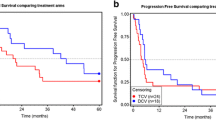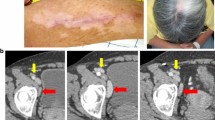Abstract
Introduction
Immunization with autologous dendritic cells (DCs) loaded with a heat shock-conditioned allogeneic melanoma cell lysate caused lysate-specific delayed type hypersensitivity (DTH) reactions in a number of patients. These responses correlated with a threefold prolonged long-term survival of DTH+ with respect to DTH− unresponsive patients. Herein, we investigated whether the immunological reactions associated with prolonged survival were related to dissimilar cellular and cytokine responses in blood.
Materials and methods
Healthy donors and melanoma patient’s lymphocytes obtained from blood before and after vaccinations and from DTH biopsies were analyzed for T cell population distribution and cytokine release.
Results/discussion
Peripheral blood lymphocytes from melanoma patients have an increased proportion of Th3 (CD4+ TGF-β+) regulatory T lymphocytes compared with healthy donors. Notably, DTH+ patients showed a threefold reduction of Th3 cells compared with DTH− patients after DCs vaccine treatment. Furthermore, DCs vaccination resulted in a threefold augment of the proportion of IFN-γ releasing Th1 cells and in a twofold increase of the IL-17-producing Th17 population in DTH+ with respect to DTH− patients. Increased Th1 and Th17 cell populations in both blood and DTH-derived tissues suggest that these profiles may be related to a more effective anti-melanoma response.
Conclusions
Our results indicate that increased proinflammatory cytokine profiles are related to detectable immunological responses in vivo (DTH) and to prolonged patient survival. Our study contributes to the understanding of immunological responses produced by DCs vaccines and to the identification of follow-up markers for patient outcome that may allow a closer individual monitoring of patients.





Similar content being viewed by others
References
Cheever MA, Higano CS (2011) PROVENGE (Sipuleucel-T) in prostate cancer: the first FDA-approved therapeutic cancer vaccine. Clin Cancer Res 17(11):3520–3526
Di Lorenzo G, Buonerba C, Kantoff PW (2011) Immunotherapy for the treatment of prostate cancer. Nat Rev Clin Oncol 8(9):551–561
Ridgway D (2003) The first 1000 dendritic cell vaccines. Cancer Invest 21:873–886
Ardavin C, Amigorena S, Reis e Sousa C (2004) Dendritic cells: immunobiology and cancer immunotherapy. Immunity 20:17–23 (Review)
Schadendorf D, Ugurel S, Schuler-Thurner B, Nestle FO, Enk A, Bröker EB et al (2006) DC study group of the DeCOG. Dacarbazine (DTIC) versus vaccination with autologous peptide- pulsed dendritic cells (DC) in first-line treatment of patients with metastatic melanoma: a randomized phase III trial of the DC study group of the DeCOG. Ann Oncol 17(4):563–570
Nestle FO, Alijagic S, Gilliet M, Sun Y, Grabbe S, Dummer R et al (1998) Vaccination of melanoma patients with peptide- or tumor lysate-pulsed dendritic cells. Nat Med 4:328–332
Rosenberg SA, Yang JC, Schwartzentruber DJ, Hwu P, Marincola FM, Topalian SL et al (1998) Immunologic and therapeutic evaluation of a synthetic peptide vaccine for the treatment of patients with metastatic melanoma. Nat Med 4:321–327
Fuessel S, Meye A, Schmitz M, Zastrow S, Linné C, Richter K et al (2006) Vaccination of hormone-refractory prostate cancer patients with peptide cocktail-loaded dendritic cells: results of a phase I clinical trial. Prostate 66:811–821
Escobar A, López M, Serrano A, Ramirez M, Perez C, Aguirre A et al (2005) Dendritic cell immunizations alone or combined with low doses of interleukin-2 induce specific immune responses in melanoma patients. Clin Exp Immunol 142(3):555–568
Palucka A, Ueno H, Connolly J, Kerneis-Norvell F, Blanck JP, Johnston DA et al (2006) Dendritic cells loaded with killed allogeneic melanoma cells can induce objective clinical responses and MART-1 specific CD8 T-cell immunity. J Immunother 9:545–557
Salcedo M, Bercovici N, Taylor R, Vereecken P, Massicard S, Duriau D et al (2006) Vaccination of melanoma patients using dendritic cells loaded with an allogeneic tumor cell lysate. Cancer Immunol Immunother 55(7):819–829
Lopez MN, Pereda C, Segal G, Muñoz L, Aguilera R, González FE et al (2009) Prolonged survival of dendritic cell-vaccinated melanoma patients correlates with tumor-specific delayed type IV hypersensitivity response and reduction of tumor growth factor β-expressing T cells. J Clin Oncol 27(6):945–952
Aguilera R, Saffie C, Tittarelli A, González FE, Ramírez M, Reyes D et al (2011) Heat shock induction of tumor-derived danger signals mediate rapid monocyte differentiation to clinically effective dendritic cells. Clin Cancer Res 17(8):2474–2483
Kantoff PW, Higano CS, Shore ND, Berger ER, Small EJ, Penson DF et al (2010) Sipuleucel-T immunotherapy for castration-resistant prostate cancer. N Engl J Med 363(5):411–422
Schwartzentruber DJ, Lawson DH, Richards JM, Conry RM, Miller DM, Treisman J et al (2011) gp100 peptide vaccine and interleukin-2 in patients with advanced melanoma. N Engl J Med 364(22):2119–2127
Kantoff PW, Schuetz TJ, Blumenstein BA, Glode LM, Bilhartz DL, Wyand M, Manson K et al (2010) Overall survival analysis of a phase II randomized controlled trial of a Poxviral-based PSA- targeted immunotherapy in metastatic castration-resistant prostate cancer. J Clin Oncol 28:1099–1105
Ridolfi L, Petrini M, Fiammenghi L, Granato AM, Ancarani V, Pancisi E et al (2011) Dendritic cell-based vaccine in advanced melanoma: update of clinical outcome. Melanoma Res 21(6):524–529
Hales RK, Banchereau J, Ribas A, Tarhini AA, Weber JS, Fox BA et al (2010) Assessing oncologic benefit in clinical trials of immunotherapy agents. Ann Oncol 21(10):1944–1951
Bilusic M, Gulley JL (2012) Endpoints, patient selection, and biomarkers in the design of clinical trials for cancer vaccines. Cancer Immunol Immunother 61(1):109–117
Ogino S, Galon J, Fuchs CS, Dranoff G (2011) Cancer immunology-analysis of host and tumor factors for personalized medicine. Nat Rev Clin Oncol 8(12):711–719
Hung K, Hayashi R, Lafond-Walker A, Lowenstein C, Pardoll D, Levitsky H (1998) The central role of CD4 (+) T cells in the antitumor immune response. J Exp Med 188(12):2357–2368
Ossendorp F, Toes RE, Offringa R, van der Burg SH, Melief CJ (2000) Importance of CD4(+) T helper cell responses in tumor immunity. Immunol Lett 74:75–77
Knutson KL, Disis ML (2005) Tumor antigen-specific T helper cells in cancer immunity and immunotherapy. Cancer Immunol Immunother 54(8):721–728
Derhovanessian E, Adams V, Hähnel K, Groeger A, Pandha H, Ward S et al (2009) Pretreatment frequency of circulating IL-17+ CD4+ T-cells, but not Tregs, correlates with clinical response to whole-cell vaccination in prostate cáncer patients. Int J Cancer 125:1372–1379
Numasaki M, Fukushi J, Ono M, Narula SK, Zavodny PJ, Kudo T et al (2003) Interleukin-17 promotes angiogenesis and tumor growth. Blood 101(7):2620–2627
Numasaki M, Watanabe M, Suzuki T, Takahashi H, Nakamura A, McAllister F et al (2005) IL-17 enhances the net angiogenic activity and in vivo growth of human non-small cell lung cancer in SCID mice through promoting CXCR-2-dependent angiogenesis. J Immunol 175(9):6177–6189
Muranski P, Boni A, Antony PA, Cassard L, Irvine KR, Kaiser A et al (2008) Tumor-specific Th17-polarized cells eradicate large established melanoma. Blood 112(2):362–373
Miyahara Y, Odunsi K, Chen W, Peng G, Matsuzaki J, Wang RF (2008) Generation and regulation of human CD4+ IL-17-producing T cells in ovarian cancer. Proc Natl Acad Sci USA 105:15505–15510
Dhodapkar KM, Barbuto S, Matthews P, Kukreja A, Mazumder A, Vesole D et al (2008) Dendritic cells mediate the induction of polyfunctional human IL17-producing cells (Th17–1 cells) enriched in the bone marrow of patients with myeloma. Blood 112:2878–2885
Martin-Orozco N, Muranski P, Chung Y, Yang XO, Yamazaki T, Lu S et al (2009) T helper 17 cells promote cytotoxic T cell activation in tumor immunity. Immunity 31(5):787–798
Inozume T, Hanada K, Wang QJ, Yang JC (2009) IL-17 secreted by tumor reactive T cells induces IL-8 release by human renal cancer cells. J Immunother 32:109–117
Nishikawa H, Sakaguchi S (2010) Regulatory T cells in tumor immunity. Int J Cancer 127(4):759–767
Gobert M, Treilleux I, Bendriss-Vermare N, Bachelot T, Goddard-Leon S, Arfi V et al (2009) Regulatory T cells recruited through CCL22/CCR4 are selectively activated in lymphoid infiltrates surrounding primary breast tumors and lead to an adverse clinical outcome. Cancer Res 69(5):2000–2009
Shen LS, Wang J, Shen DF, Yuan XL, Dong P, Li MX et al (2009) CD4(+)CD25(+)CD127(low/-) regulatory T cells express Foxp3 and suppress effector T cell proliferation and contribute to gastric cancers progression. Clin Immunol 131(1):109–118
Leffers N, Gooden MJ, de Jong RA, Hoogeboom BN, ten Hoor KA, Hollema H et al (2009) Prognostic significance of tumor-infiltrating T-lymphocytes in primary and metastatic lesions of advanced stage ovarian cancer. Cancer Immunol Immunother 58(3):449–459
Wan YY, Flavell RA (2007) Yin-Yang functions of transforming growth factor-β and T regulatory cells in immune regulation. Immunol Rev 220:199–213
Flavell RA, Sanjabi S, Wrzesinski SH, Licona-Limón P (2010) The polarization of immune cells in the tumour environment by TGF beta. Nat Rev Immunol 10(8):554–567
Kobie JJ, Wu RS, Kurt RA, Lou S, Adelman MK, Whitesell LJ (2003) Transforming growth factor beta inhibits the antigen-presenting functions and antitumor activity of dendritic cell vaccines. Cancer Res 63:1860–1864
Kao JY, Gong Y, Chen CM, Zheng QD, Chen JJ (2003) Tumor-derived TGF-β reduces the efficacy of dendritic cell/tumor fusion vaccine. J Immunol 170:3806–3811
Nam JS, Terabe M, Mamura M, Kang MJ, Chae H, Stuelten C et al (2008) An anti-transforming growth factor beta antibody suppresses metastasis via cooperative effects on multiple cell compartments. Cancer Res 68(10):3835–3843
Biswas S, Guix M, Rinehart C, Dugger TC, Chytil A, Moses HL et al (2007) Inhibition of TGF-beta with neutralizing antibodies prevents radiation-induced acceleration of metastatic cancer progression. J Clin Invest 117(5):1305–1313
Wilke CM, Bishop K, Fox D, Zou W (2011) Deciphering the role of Th17 cells in human disease. Trends Immunol 32(12):603–611
Quezada SA, Peggs KS, Simpson TR, Allison JP (2011) Shifting the equilibrium in cancer immunoediting: from tumor tolerance to eradication. Immunol Rev 241(1):104–118
Ikeda H, Old LJ, Schreiber RD (2002) The roles of IFN gamma in protection against tumor development and cancer immunoediting. Cytokine Growth Factor Rev 13(2):95–109
Terabe M, Matsui S, Park JM, Mamura M, Noben-Trauth N, Donaldson DD, Chen W, Wahl SM, Ledbetter S, Pratt B, Letterio JJ, Paul WE, Berzofsky JA (2003) Transforming growth factor-beta production and myeloid cells are an effector mechanism through which CD1d-restricted T cells block cytotoxic T lymphocyte-mediated tumor immunosurveillance: abrogation prevents tumor recurrence. J Exp Med 198(11):1741–1752
Tittarelli A, González FE, Pereda C, Mora G, Muñoz L, Saffie C, García T, Díaz D, Falcón C, Hermoso M, López MN, Salazar-Onfray F (2012) Toll-like receptor 4 gene polymorphism influences dendritic cell in vitro function and clinical outcomes in vaccinated melanoma patients. Cancer Immunol Immunother. doi:10.1007/s00262-012-1268-7 (in press)
Acknowledgments
Grants from the National Fund for Scientific and Technological Development (FONDECYT 1090243, 1090238, 3090044), the Fund for the Promotion of Scientific and Technological Development (FONDEF DO5I10366), and the Millennium Science Initiative from the Ministry supported this work for the Economy, Development and Tourism (P09/016-F).
Author information
Authors and Affiliations
Corresponding author
Rights and permissions
About this article
Cite this article
Durán-Aniotz, C., Segal, G., Salazar, L. et al. The immunological response and post-treatment survival of DC-vaccinated melanoma patients are associated with increased Th1/Th17 and reduced Th3 cytokine responses. Cancer Immunol Immunother 62, 761–772 (2013). https://doi.org/10.1007/s00262-012-1377-3
Received:
Accepted:
Published:
Issue Date:
DOI: https://doi.org/10.1007/s00262-012-1377-3




